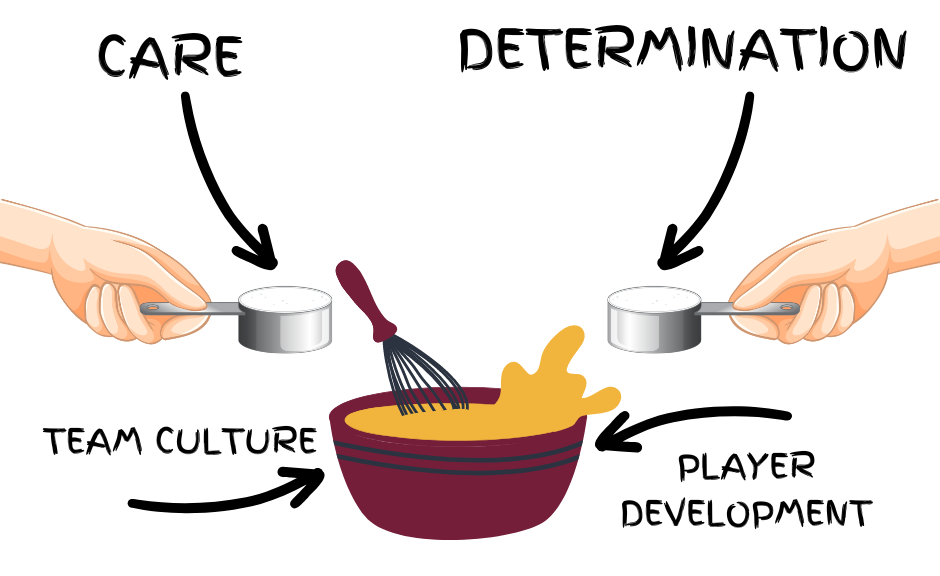The ‘Caring Determination’ Coaching Style
Since the 2022/2023 season we have been asking all coaches to embody a coaching style called ‘caring determination’. But what is it, and what does it look like?
Origins of Caring Determination
Researchers Sergio Lara Bercial and Cliff Mallett set out to study what they called ‘serial winning coaches’: coaches who had won major international championships with multiple athletes or teams in multiple contexts.
Picture the high jump coach who leads two different athletes to Olympic gold medals, or the WNBA coach who leads 3 different teams to NBA Championships.
In 2024 they released their findings in the book ‘Learning from Serial Winning Coaches’ which describes the journeys and behaviours of these outlier coaches across 10 sports, and their common approach summarised as “caring determination”.
Defining Caring Determination
Sergio and Cliff define caring determination as:
“The relentless pursuit of excellence balanced with a genuine and compassionate desire to support athletes and oneself.”
You might expect the most successful elite coaches to have a hardened edge, feared by their athletes and demanding excellence at every turn. But this is not the case, or at least only a small part of their coaching style. The key here is the presence of both ‘caring’ and ‘determination’ components - which present to the coach like measuring cups in the pursuit of creating the optimal team culture.
The ‘Caring’ Part
There are four key areas of ‘caring’ coaching:
Athlete-centredness: Recognising that you don’t coach basketball, you coach a person (e.g. ‘Jacob’) through basketball.
Placing the person (and their wellbeing) first before them as an athlete, and
Taking a long-term, well-rounded view of their development
Assuming good intent when they fall short of expectations
Stablility and Dependability: Being trustworthy and approachable, and supportive under pressure
Adaptive Coaching: To each athlete and situation
Shared Leadership: Giving controlled freedom to athletes and being collaborative across players and staff.
THE ‘DETERMINED’ PART
There are five key areas of coaching with ‘determination’:
Focus: Attention to the macro (clear vision and purpose) as well as micro (systems and strategies) that will lead to success.
Commitment: Having self-belief and taking calculated risks.
Standards: Regularly raising the bar of expectations, maintaining high levels of accountability
Passion: Bringing high energy and work ethic, along with self-care and self-improvement
Resilience: Being realistic and solution-focused, accepting outcomes (recognising ‘the sun will rise again’)
Complex Ideas made simple = ‘Simplexity’
Serial-winning coaches have the ability to make complex ideas simple for their athletes - giving them clarity and confidence to perform on game day.
tHE rEP cOACH & ‘Caring Determination’
It’s our belief that this coaching style can (and should) be applied across any talent development environment like the VJBL. It might look slightly different at each level. For example:
For the U12s coach, “unwavering high standards and accountability” might simply extend to the process - jogging in/out of drills and listening to their coach, and trying one’s best - whereas for U18s/20s there might be a sharpened accountability on performance/execution.
Do you have the balance right?
The biggest challenge that coaches have is balancing the two qualities.
When a coach is under-doing the caring component, they may have elaborate systems and high levels of excellence on-court, but they view their athletes as chess pieces or factory workers to direct and discipline at their disposal. Coaches in this situation should look to:
Have more informal 1:1 interactions with athletes, getting to know what makes them tick on and off the court.
Find opportunities to trust certain athletes with more court time, and place their development first.
Smile more often - Rep should be developmental AND fun.
Admit to your faults as a coach.
When a coach is under-doing the determination component, it is clear they have a connection with their athletes but the performance environment (be it trainings or games) lacks energy, passion, and unwavering high standards. Coaches in this situation should look to:
Plan purposeful trainings that balance the needs of next week, next month and next year.
Give more feedback to athletes on how to improve.
Co-design standards (behaviours) and point one when these are / aren’t being met.
‘Critique effort first’ - Pete Carroll (Seattle Seahawks NFL)
Make everything competitive in your trainings, whether team vs team or individuals pursuing a ‘high score’ (score, target).
fINAL thought
If the most winningest gold-medal coaches coach with humility and care, there is no excuse for the VJBL coach to have a ‘win at all costs’ mentality. It’s rather the pursuit of winning that we must instil in our athletes, based on a process of high determination and care/compassion in equal doses.
Source
Lara-Bercial, Sergio & Mallett, Cliff. (2017). Driven Benevolence: Leadership Lessons from Serial Winning Coaches.



